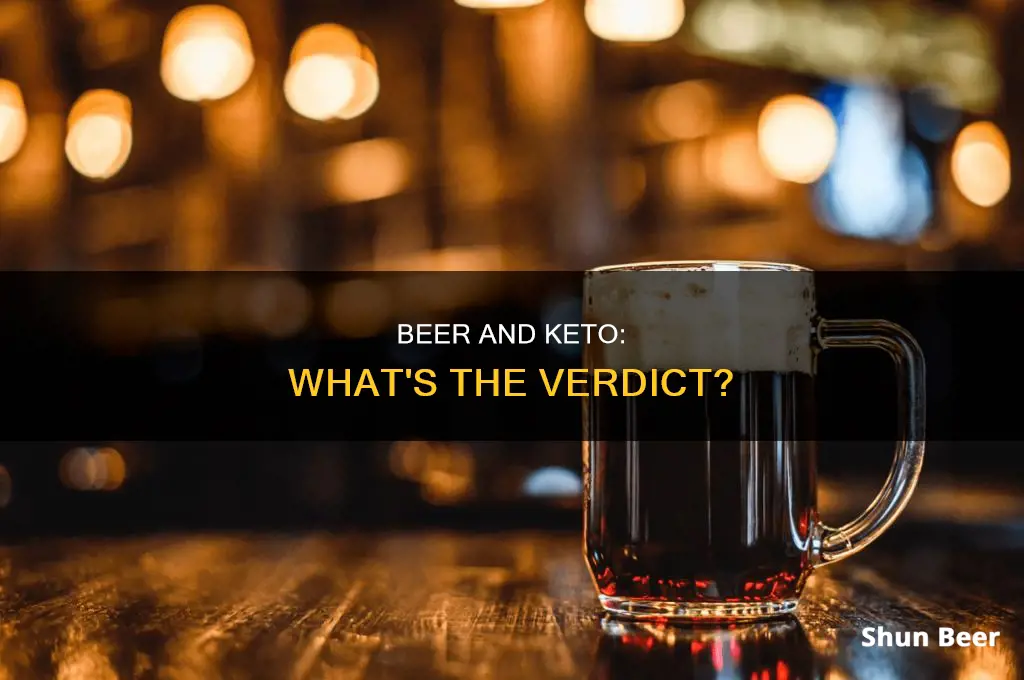
The ketogenic (keto) diet is a low-carb, high-fat diet that many people adopt to lose weight and improve their health. While on the keto diet, you can still enjoy alcoholic drinks in moderation, as long as they are low in carbs. Pure forms of alcohol like whiskey, gin, tequila, rum, and vodka are all completely free of carbs. Wine and light beers are also relatively low in carbs, usually containing under 6 grams per serving. However, regular beer is produced from starch and can contain 12 grams of carbs or more in just one can, so it's best to opt for low-carb beers if you're following a keto diet.
What You'll Learn

Pure alcohol is carb-free
Pure alcohol is indeed carb-free. Spirits such as gin, rum, tequila, whiskey, and vodka contain no carbohydrates. This means that, when on a keto diet, you can still enjoy a drink, as long as you are careful about what you choose.
If you are drinking spirits, be mindful of what you mix them with. Many popular mixers, such as coke, lemonade, and fruit juice, are high in sugar and carbohydrates. A vodka tonic, for example, may sound like a good low-carb option, but tonic water contains a lot of sugar, so a vodka tonic has 15 grams of total carbs. A rum and Coke is another drink to avoid, as a can of Coca-Cola contains 39 grams of carbs.
If you want to stick to zero-carb alcohol, you can mix your spirit with soda water or a flavoured sparkling water. You could also try a gin and tonic, using a low-carb tonic water.
If you don't like straight liquor, there are other low-carb options. Light beers, for example, tend to be lower in carbs. A pale lager contains an average of 5.8 grams of carbs per can, and a light lager can be as low as 4 grams of carbs per can. Some beers are also marketed as low-carb.
Wine also tends to be relatively low in carbs. A standard glass of red or white wine contains about 4.7 grams of carbs. Dry wines have the lowest sugar content, so are the best option for anyone on a keto diet. A glass of champagne or prosecco has less than 1 gram of carbs per ounce.
Golfing and Beer Drinking at Hillandale: Is It Allowed?
You may want to see also

Wine and light beer are low-carb options
Wine typically contains under 6 grams of carbohydrates per serving, with dry wines having the lowest sugar content. For example, a standard glass of both red and white wine contains approximately 4.7 grams of carbohydrates. When it comes to specific types of wine, Pinot Grigio, Cabernet Sauvignon, and Pinot Noir are good choices, as they are drier and offer fewer carbs per ounce than sweeter wines.
If you're a beer drinker, opting for light beers can be a better choice when on a keto diet. Pale lagers, for instance, contain an average of 5.8 grams of carbs per can. Some beers are also marketed as low-carb options, such as Corona Premier, which is a low-calorie, light, and crisp beer.
While wine and light beer are lower in carbs compared to other alcoholic beverages, it's important to remember that alcohol can affect your judgment and willpower. Additionally, alcohol provides empty calories, which can contribute to weight gain and nutritional deficiencies over time. Therefore, it's crucial to consume these beverages in moderation and ensure they don't negatively impact your diet and overall health.
Drinking Beer in Public: Las Vegas Laws and Where to Enjoy
You may want to see also

Spirits with low-carb mixers are keto-friendly
Pure forms of alcohol like whiskey, gin, tequila, rum, and vodka are all completely free of carbs. You can drink them straight or mix them with low-carb options for more flavour.
Low-carb mixers include:
- Diet soda
- Seltzer
- Diet tonic water
- Powdered flavour packets
- Diet ginger beer
- Soda water
- Sugar-free or unsweetened juice
- Club soda
- Sparkling water
- Diet ginger ale
Cocktails like the vodka-soda, gin rickey, dry martini, and gin and tonic (with diet tonic) are ultra-dry, simple, and have a better chance of being low-carb.
It's important to note that while there are keto-friendly alcoholic drinks, alcohol can affect your decision-making and willpower, which could lead to breaking your diet. Alcohol can also stall weight loss and increase hunger or cravings. Therefore, it's crucial to drink in moderation and always opt for low-carb mixers to stay within your keto diet limits.
Beer and Anastrozole: What You Need to Know
You may want to see also

Alcohol can slow down weight loss
While it is possible to drink beer on a keto diet, it is important to note that alcohol can slow down weight loss. Here are some reasons why:
Empty Calories
Alcoholic drinks are often referred to as providing "empty" calories. This means that they give your body calories but very few essential nutrients. A single glass of wine or a can of beer can contain over a hundred calories, and drinks with mixers like fruit juice or soda have even more. Overindulging in these drinks can lead to gradual weight gain over time.
Alcohol as a Primary Fuel Source
When alcohol is consumed, it is burned first as a fuel source before your body uses anything else. This includes glucose from carbohydrates or lipids from fats. As a result, the excess glucose and lipids are stored as adipose tissue, or fat, in your body.
Impact on Organs
Excess alcohol consumption can lead to alcoholic fatty liver, which can damage your liver and affect how your body metabolizes and stores carbohydrates and fats. Changes in the way your body stores energy from food can make it challenging to lose weight.
Increased Belly Fat
Consuming foods and drinks high in simple sugars, such as those found in candy, soda, and beer, can quickly lead to weight gain. The body tends to accumulate this extra weight in the abdominal area, contributing to the "beer gut" effect.
Impaired Judgment and Increased Hunger
Alcohol lowers inhibitions and can lead to poor food choices. It can trigger hunger signals in the brain, leading to an increased urge to eat more. This can sabotage your weight loss efforts, especially if you are trying to stick to a calorie-controlled diet.
Negative Impact on Sleep
Research suggests that alcohol can disrupt sleep cycles, leading to sleep deprivation. This, in turn, can affect the balance of hormones related to hunger, satiety, and energy storage.
Digestive Issues
Alcohol inhibits proper digestive function, causing stress on the stomach and intestines. It leads to decreased digestive secretions and reduced movement of food through the tract. This impairs the breakdown and absorption of nutrients, affecting the metabolism of organs involved in weight management.
Drinking Beer While on Dexilant: What You Need to Know
You may want to see also

Alcohol affects decision-making and willpower
Alcohol can affect your decision-making and willpower, especially when you are on a keto diet.
The keto diet is a low-carb, high-fat diet that can offer many health benefits, including weight loss and improved health. However, it requires careful planning and strict adherence to keep your body in ketosis and achieve the desired results.
Alcohol can impact your decision-making and willpower in several ways, especially when combined with the challenges of sticking to a keto diet:
- Increased impulsivity: Alcohol is a depressant that slows down your body's nervous system. This can lead to lowered inhibitions and impaired judgment, making it harder to stick to your diet.
- Disruption of ketosis: Alcohol is high in carbs, and if you have mixed drinks with too much sugar, it can quickly take your body out of ketosis. This can slow down your weight loss progress and affect your health goals.
- Loss of self-control: Drinking alcohol can lower your self-control, making it more challenging to resist high-carb foods that are not allowed on the keto diet. This can lead to poor food choices and negatively impact your progress.
- Nutritional deficiencies: Alcoholic drinks are often referred to as "empty calories." Overindulging in alcohol can contribute to nutritional deficiencies and gradual weight gain over time, undermining the health benefits of the keto diet.
- Health risks: Excessive drinking can lead to serious health conditions such as liver problems, cancer, and heart disease. It is essential to keep alcohol intake moderate, especially when on a keto diet, to minimise these risks.
- Altered metabolism: Alcohol affects your body's metabolism by prioritising the breakdown of alcohol for energy over the breakdown of fat. This can stall your weight loss progress and disrupt the intended effects of the keto diet.
To minimise the impact of alcohol on your decision-making and willpower while on a keto diet, it is crucial to drink in moderation and choose low-carb alcoholic beverages. Pure forms of alcohol like whiskey, gin, tequila, rum, and vodka are carb-free. Wine, light beer, and low-carb mixers like diet soda or seltzer are also lower in carbs. However, it is important to prioritise your health and well-being and avoid alcohol altogether if you feel it interferes with your ability to stick to your keto diet.
Near Beer After Neuropathy: Is It Safe?
You may want to see also
Frequently asked questions
Yes, you can, but in moderation. Beers that are light and low-carb are better options.
Some beers that are considered keto-friendly include Devils Back Bone Brewing Tangerine Sparkling Ale, Corona Premier, and DayTime IPA.
Beer typically has a higher carb content, which can take the body out of ketosis. However, light and low-carb beers can be consumed in moderation without disrupting the diet.
Yes, pure forms of alcohol like whiskey, gin, tequila, rum, and vodka are carb-free. Wine, particularly dry wines, are also relatively low in carbs.
It is best to avoid mixed drinks with fruit juice or soda, flavoured hard liquor, and drinks high in carbs and sugar. These drinks can quickly take you out of ketosis and are best avoided altogether.







